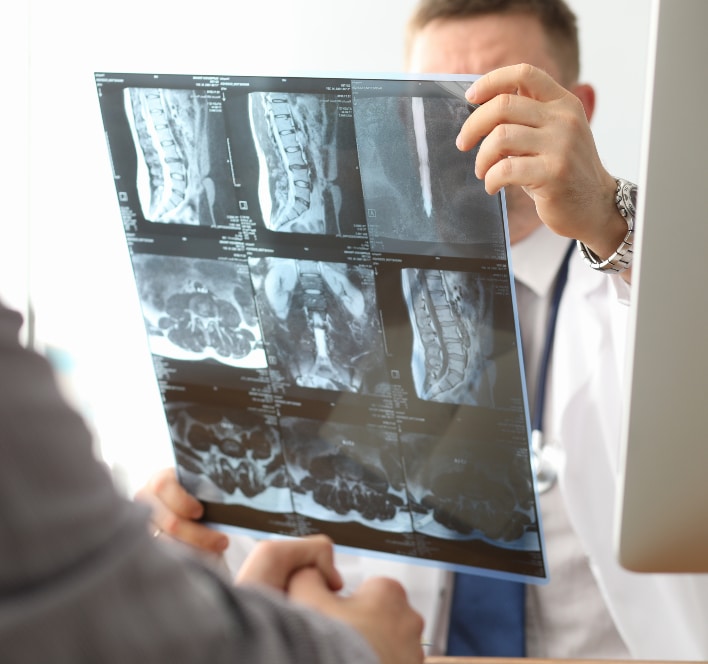Find Orthopedic Surgeon in Westchester
An artificial disk replacement or lumbar disk replacement is a type of surgery where worn or damaged disk material between the bones of the spine is removed and replaced with an artificial disk.
The spine is made up of vertebrae bones, but it’s not just one long bone. Our spine comprises 33 stacked vertebrates on top of each other. Hence, there needs to be some form of cushion, so these bones come in direct contact and wear out.
This is why disks are so important. They allow the vertebrae to rotate and move without damaging each other. An artificial disk replacement replaces a degenerated or worn-out disk with an artificial disk made of metal or a combination of plastic and metal.
Artificial disk replacement is generally seen as an alternative to Spinal Fusion Surgery, where the two vertebrae are permanently joined together.
Why Might I Need To Get Artificial Disk Replacement Surgery and How Our Spine Surgeons Westchester NY Can Assist You?
The main reason why anyone would need lumbar replacement disk surgery is to treat acute lower back pain. However, not all backaches will require replacement surgery. Before your physician recommends surgery, they must conduct some tests to determine whether or not you will need surgery.
- In general, here are some conditions in which we will recommend lumbar disk replacement:
- If the source of your back pain mostly comes from one or two disks in your lower spine.
- If there is no history of joint disease or compression on the nerves of your spine
- If you are not obese
- If you have no history of spinal surgery
- If you don’t have any spinal deformity or scoliosis
At NJ Spine & Orthopedics, we give our patients the best options available and use minimally invasive treatments. That is why we conduct as many tests as required before suggesting surgery to our patients in the Westchester area.
What Are The Risks Of Lumbar Disk Surgery
Like all surgeries, disk replacement surgery poses some risks. Firstly, disk replacement surgery requires great access to the spine, which makes the procedure risky. The primary purpose of this procedure is to bring pain relief by removing the painful disk and filling up the gap with a prosthetic implant.
The risk patients face is also determined by the surgical approach. For example, an anterior approach (from the front) makes a disk replacement surgery as risky as fusion surgery, and patients are likely to face similar complications.
However, our Orthopedic surgeons in Westchester are determined to give patients the best care possible, as well as educate them on the surgery, its risks, recovery time, and advantages. This way, our patients can make well-informed decisions on what’s best for them.
Some of the potential risks of this surgery include:
- Infection of the artificial disk or the area around it
- Implant fracture or failure
- Complications when the implant isn’t placed properly
- Stiffness or rigidity of the spine
- Stenosis (narrowing of the spine) because of the breakdown of spinal bones
- Implant loosening or wear
In open consultation, we will provide a more specific educational guide on the risks associated with your specific medical condition.
What Happens During Artificial Disc Replacement?
During the procedure, you will have an IV line put into your hand or arm through which an anesthetic is administered. This will put you in a deep sleep so you don’t feel any pain during the surgery.
A team of surgeons will be needed for this operation, usually made up of an orthopedic surgeon, a vascular surgeon, and sometimes, a neurosurgeon. An incision will be made on your abdomen, which will allow us to move your organs and blood vessels out of the way to allow access to your spine.
We will then remove the damaged disk and put the new artificial disk in place. Next, we will put your organs and blood vessels back in place before closing the incision.
After the successful surgery, you will be taken to a recovery area for close monitoring until you wake up. We sometimes use a catheter to make urination easier, and you will have an IV line supplying your essential medication. When you are fully awake, you will be taken to your hospital room.
What Happens After Artificial Disk Replacement?
You will need to spend a couple more days in the hospital post-surgery for monitoring and care. We will provide pain management medications. Since lumbar disk surgeries don’t require the bone to heal, the recovery period may be faster than with other surgeries.
You may need physical therapy to show you how to move properly and exercise. Gentle trunks and twists keep your spine lumbar and speed up recovery. As you get better, you will begin to stretch and walk.
Recovery can take anything from a few weeks to months, so don’t push it. You should avoid jarring activities and motions and stick to your doctor’s recommendations.

